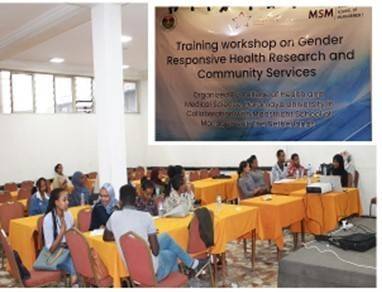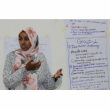MSM Building the Capacity of Health Researchers and Medical Practitioners on Gender Responsive Research and Community Outreach
From 1 to 3 June 2022, a three-day training workshop was organized in Health and Medical College and Teaching Hospital at Haramaya University, College of Health and Medical Sciences (CHMS) in Ethiopia, on gender-responsive research and community outreach. The training was supported by the Elisabeth Strouven Foundation and the Maastricht School of Management (MSM).
Twenty-two people joined the workshop in Harar town, five of them men. Among the participants were lecturers, researchers, medical practitioners and project officers from CHMS, Hiwot Fana Specialized Hospital, and Child Health and Mortality Prevention Surveillance (CHAMPS) networks.
The main objective of the training was to create understanding and develop the skill to conduct health and medical research that is informed by a systematic gender analysis and delivers outcomes that equally benefit men and women and various marginalized groups. The training also aimed to create understanding on how to make a conscious effort to address gender and social inequalities through health and medical outreach activities.
The training started by creating understanding on gender as a power relation that affects research outcomes, and also results in gender inequality in participation and benefit from community outreach, and continued with gender-responsive research. Through lectures, individual and group exercises, and discussions, participants learned how to integrate gender in health research content, process, and outcomes.
They practiced conducting gender-responsive research by using WHO’s six health system building blocks and the four domains for understanding gender as a power relation: who has what (access to resources); who does what (the division of labour and everyday practices); how values are defined (social norms) and who decides (decision making power).
The participants also reviewed selected health and medical articles from gender perspectives and commented on their gender responsiveness.
During the presentations and discussions, most of the participants enthusiastically mentioned that they never realised that gender relation is power relation, which needs to be acknowledged strongly influencing research outcomes. In addition, most participants, when incorporating gender into their research, often focus on women only or do not go beyond sex disaggregation. They now learned that this practice ignores the socially constructed power relations and gender norms that exist between and among men, women, and other marginalized groups, which can lead to vastly different health system needs, experiences and outcomes.
The other focus areas of the training were gender-responsive outreach projects/programs. A lecture on conceptual clarification and the need for gender-responsive community projects was made. The participants were also introduced into the framework for gender dimensions in the process of community services. These are gender-equitable participation in decision-making, access to and control over resources, access to financial services and markets, control over income and benefits, equitable workload, and response to issues of gender-based violence.
Using the framework, each participant shared his/her experiences on dimensions he/she takes into account to ensure gender equality in outreach services including the key challenges. The participants realized effective community services demand equitable participation, contributions, and benefit of benefits for both men, women, boys, and girls in the community.
Strong emphasis was also put on the need to continuously assess the gender dynamics in communities to tailor outreach services’ approaches to the needs, priorities, and interests of women and men of different ages and socioeconomic and cultural backgrounds.
Finally, the training materials were given to all the participants so that each of them can share his/her knowledge with their respective team. The participants suggested that a network be created so that the learning will continue on a different platform. Accordingly, a Telegram group was created to continue the discussions; support each other in research and community projects, and team up to design and implement research and community projects. Moreover, the Chief Academic and Research director of CHMS promised to motivate and support the staff who integrate gender in research and outreach services.


MSM's Expert Centre on Emerging Economies
This project is part of MSM's Expert Centre for Emerging Economies. The department is an expert centre on local economic development in emerging and developing markets. We capacitate managers and professionals from government, private sector, NGOs, and post-secondary education in Africa, Asia, Middle East, and Latin America. We offer consultancy and customized training programs, and we manage complex projects in key sectors, e.g. water, agriculture and health. For more information click here.
Related news
Promoting Gender Responsive Leadership in Health at the Medical College and Teaching Hospital
Gender awareness creation and ways forward in the health and medical sector in Ethiopia
Capacity Enhancement to achieve Gender Equality and Women Empowerment in the Medical Sector in developing countries
Female Talent Development in Ethiopia

